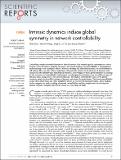Intrinsic dynamics induce global symmetry in network controllability
Author(s)
Zhao, Chen; Wang, Wen-Xu; Liu, Yang-Yu; Slotine, Jean-Jacques E.
DownloadZhao-2015-Intrinsic Dynamics.pdf (1015.Kb)
PUBLISHER_CC
Publisher with Creative Commons License
Creative Commons Attribution
Terms of use
Metadata
Show full item recordAbstract
Controlling complex networked systems to desired states is a key research goal in contemporary science. Despite recent advances in studying the impact of network topology on controllability, a comprehensive understanding of the synergistic effect of network topology and individual dynamics on controllability is still lacking. Here we offer a theoretical study with particular interest in the diversity of dynamic units characterized by different types of individual dynamics. Interestingly, we find a global symmetry accounting for the invariance of controllability with respect to exchanging the densities of any two different types of dynamic units, irrespective of the network topology. The highest controllability arises at the global symmetry point, at which different types of dynamic units are of the same density. The lowest controllability occurs when all self-loops are either completely absent or present with identical weights. These findings further improve our understanding of network controllability and have implications for devising the optimal control of complex networked systems in a wide range of fields.
Date issued
2015-02Department
Massachusetts Institute of Technology. Department of Brain and Cognitive Sciences; Massachusetts Institute of Technology. Department of Mechanical Engineering; Massachusetts Institute of Technology. Nonlinear Systems LaboratoryJournal
Scientific Reports
Publisher
Nature Publishing Group
Citation
Zhao, Chen, Wen-Xu Wang, Yang-Yu Liu, and Jean-Jacques Slotine. “Intrinsic Dynamics Induce Global Symmetry in Network Controllability.” Sci. Rep. 5 (February 12, 2015): 8422.
Version: Final published version
ISSN
2045-2322